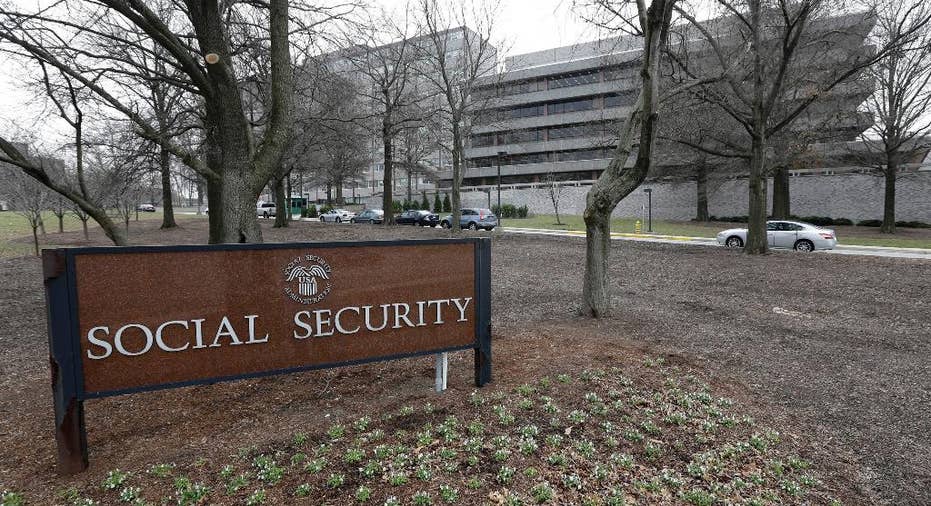Taxes are taking a growing percentage of SS benefits from seniors

The Social Security Administration's main campus is seen in Woodlawn, Md. . (AP Photo/Patrick Semansky, File)
Now that the Tax Cuts and Jobs Act is signed into law many Americans will realize some kind of tax cuts. For seniors, depending on their retirement income, some will receive tax cuts while others will see no change, and some may even be worse off.
“Recently enacted changes in the tax law will increase both the numbers of taxpayers whose Social Security benefits are taxable and the portion of Social Security income that people will pay in taxes,” says The Senior Citizens League’s Social Security and Medicare policy analyst Mary Johnson.
Johnson discussed with Fox Business what the new tax legislation might mean for those nearing or in retirement.
Boomer: How will recent changes in the tax law affect Social Security beneficiaries?
Johnson: About 56 percent of all Social Security households pay taxes on a portion of their Social Security benefits. On average, those households pay about 6.7 percent of their benefit income in taxes. While the new law is expected to lower taxes for many people, it did not change the income thresholds that subject Social Security benefits to taxation, which remain $25,000 for individuals and $32,000 for couples filing jointly. What the new tax law may do is lower the amount of other income subject to taxation.
The biggest changes coming for 2018 tax year are lower tax rates and a bigger standard deduction. Lower taxable income may allow a greater portion of Social Security income to remain tax-free. But the tax law gets rid of personal exemptions, a number of deductions, and restricts other deductions such as imposing a new limit on what people can deduct in state and local taxes. In addition, tax brackets and the standard deduction are indexed using a more slowly growing measure of inflation, the Chained Consumer Price Index. That will mean the standard deduction will become less generous over time than it used to be, and people will get pushed into higher tax brackets as more income becomes taxable.
While most of the tax changes affect the 2018 tax year and thereafter, there’s one change that affects taxpayers 65 and older this tax season — which is for the 2017 tax year. It has to do with the medical expense deduction. Prior to the new tax law, the income threshold that determines the amount of medical expenses that taxpayers 65 and older are allowed to deduct was set to rise from the amount in excess of 7.5% of Adjusted Gross Income (AGI) to the amount in excess of 10% of (AGI). The new tax bill delays that increase for two years and keeps the threshold at 7.5% of the AGI for people age 65 and older for this year and next — good news for anyone having high medical costs in 2017 or in 2018.
Boomer: What determines if your SS benefits are subject to taxation?
Johnson: To quickly determine whether a portion of benefits is taxable, taxpayers should take their adjusted gross income, and add any nontaxable interest, plus one - half of Social Security income. If the amount determined is over the threshold, $25,000 (individuals) $32,000 (joint), then a portion of Social Security benefits would be taxable. To learn how, much see IRS publication 915 Social Security and Equivalent Railroad Retirement Benefits for worksheet and help in preparing tax returns.
The problem for older taxpayers is the fact that these income thresholds have never been adjusted for inflation. When Congress first enacted the tax on Social Security in 1983, it was estimated to affect only 10 percent of Social Security recipients. Today, the taxation of benefits hits almost everyone with any income in addition to Social Security benefits —even people with the most modest of bottom lines. An older couple with $32,000 is living at just 155% of the federal poverty level. Had the income thresholds been adjusted for inflation since 1983, the $25,000 threshold (individuals) would be $61,940 this year and the $32,000 threshold (joint) would be $79,284.
Boomer: Should a household increase the amount of tax withholdings from their SS income?
Johnson: That’s a question that taxpayers need to put to their tax advisors, because each household’s situation is different. I’m not a tax professional, and I too have a list of questions about the changes for my tax preparation service! Older taxpayers may want to check their local senior centers and public libraries to learn of any special presentations that may be given about upcoming changes in the tax law.
Boomer: Are there any changes expected to Medicare with the new tax law?
Johnson: The tax law does not explicitly affect Medicare, but it takes an enormous amount of revenue out of the system — an estimated $1.5 trillion that’s needed to fund Medicare and Medicaid benefits. The government is expected to take in about $15 billion less in tax revenue each month just this year. With rising deficits that’s likely to lead to increased calls to cut Medicare and Medicaid.
The President’s new budget for example, would cut $514 billion from Medicare spending over the next ten years. He also continues to call for capping Medicaid payments through block grants to states. Currently about one - in - five older Americans, some eleven million have income so low that they receive Medicaid in addition to Medicare. Medicaid programs pay Medicare premiums and if income is low enough, out-of-pocket costs. Medicaid also pays for about - two thirds of all nursing home stays. The proposed cuts do little to fix existing problems with rising healthcare costs or ensure that people will be able to continue to have access to reliable, high quality health services



















